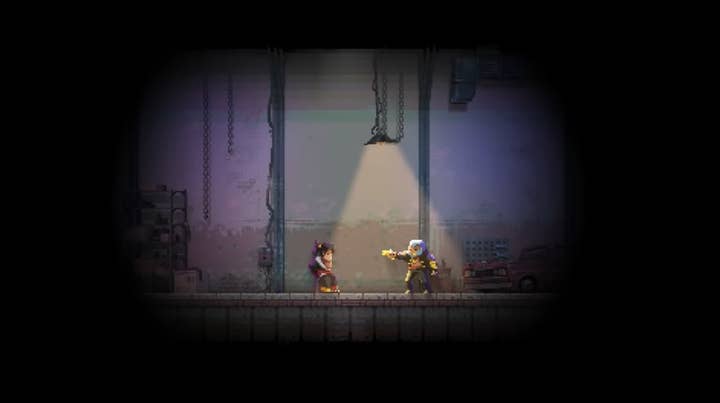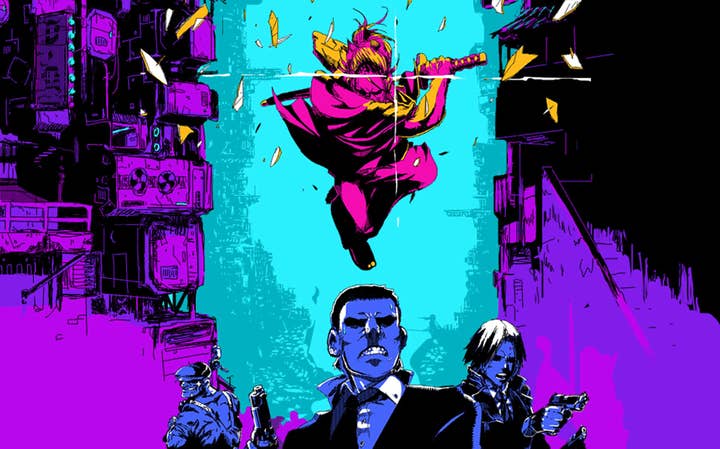How does a hit like Katana Zero change things for a creator?
Juggling multiple projects helped produce Justin Stander's breakthrough hit, but he's now looking forward to creating one thing at a time
Katana Zero debuted on PC and Nintendo Switch a little more than a year ago. Speaking with GamesIndustry.biz recently, Katana Zero lead developer Justin Stander says it has been successful far beyond his expectations.
That kind of success can be life-changing for an indie developer, not just in the amount of money they have in their bank account but in the way they approach a career in game development.
"I was working on multiple projects before Katana Zero came out," Stander explains, "and a big part of the reason I was doing that was to hedge my bets because the indie game market is extremely volatile."
Those projects include Pocket Squirrel, a mobile game collaboration with YouTuber iDubbbz about breeding and competing squirrels, and a pair of unannounced titles he's spent significant time on and still intends to wrap up. Those are all in addition to a free add-on for Katana Zero that was teased in the original game.
"The main reason behind me working on so many games at once was to hedge my bets, so if Katana Zero didn't work out, then at least I didn't spend the last five years of my life only working on one game that flopped," he says. "Instead, I was working on multiple games, and there's a much greater chance at least one of them would do well and make up for all the time I spent working on it.
"Now that Katana Zero has come out and was very successful, I don't really feel that urge to work on so many projects at once. I don't feel a need to hedge my bets anymore, but as a result, I have a huge backlog of almost-finished games I have to clear up before I go work on something new."
Stander admits the situation is a bit frustrating, saying: "I do really like all the projects I'm working on, but at the same time I still feel like I have this ball and chain of all these projects I have to finish now. It's an overwhelming feeling that I have to do so much to clear my plate before I can start thinking about what's next."
That frustration aside, Stander says having different projects to jump between helped his process considerably.
"Now that Katana Zero has come out and was successful, I don't really feel that urge to work on so many projects at once"
"I'm pretty much always working on something, but the weird thing is I found that I work the hardest on something when I'm procrastinating on something else. When I got really deep into Katana Zero development, there was a certain point where it became a slog... Even the act of adding just one small element to the game had to be linked to all these systems and it became a huge monolithic effort just to add a turret, or a new enemy type or something. Because things were slowing down there so much, I started working on Pocket Squirrel, and Pocket Squirrel became so breezy and so fast to work on."
Stander made huge progress on Pocket Squirrel when he was avoiding working on Katana Zero, just like he made huge progress on Katana Zero when he was avoiding his school work in college.
"In a bigger way, it was just nice to have a change of pace with the different projects," he says. "They all have different design philosophies. They all have different problems to tackle so I don't get burned out on any one specific thing. If I had to design all of Katana Zero's levels in one go, I probably would have had a sharp decline in quality at some point. But because I was able to switch back and forth between other projects, I was able to keep everything at a good level because I didn't burn myself out on any one task too much."
Despite that, Stander says he's eager to start focusing on one project at a time.
"There are certain games I've wanted to make pretty much since I began making games -- slightly more experimental stuff, maybe with not as wide an audience as Katana Zero. That's the story of stuff I'd be worried about making as my first game because it doesn't have that immediate, broad appeal... I'd definitely be happy to put all my eggs in one basket for future projects since my entire career doesn't depend on it at that point."

Even if such a title were to flop, Stander is confident that Katana Zero has long enough legs to make such a situation tenable.
"You release a game, and there's kind of a big hill you have to get over that represents word of mouth and getting people to play it," Stander says. "And if you're able to get over that hill, then the car basically drives itself. Katana Zero was able to get over that hill, and now people will just keep playing it, buying it, and spreading it because it's got that amount of momentum where the game will maintain itself without any future marketing. But that initial push over the hill is just a massive effort to get people initially interested in it.
"A lot of people ask me if it's worth working with a publisher for marketing because they take a percentage of the game sales. And you can't really know how much impact they had on the sales overall, but my general feeling is when you release a game, you need to go all-in on every single little push you can to get over that hill. Devolver [Katana Zero's publisher] definitely helped give a big push."
While Stander believes that billing future games as coming from the developer of Katana Zero will be another push working in his favor, he doesn't want to lean too heavily on that.
"When you release a game, you need to go all-in on every single little push you can to get over that hill"
"I think baseline, having a name attached is important," he acknowledges. "But I tend to believe every game should really be looked at on its own merits. Personally, one of the things I really dislike about certain artists, or even some developers, is that they come out with an extremely good, popular game, and then their next release is just completely off the rails, just zero popular appeal."
He points to Kanye West as an example, saying the rapper followed up his hugely popular 2010 album My Beautiful Dark Twisted Fantasy with 2013's "very unlikeable" Yeezus.
"I found that a lot of artists did this sort of thing, which is as soon as they had their biggest commercial success, their magnum opus, their follow-ups would just be these bizarre, small things that didn't measure up at all," Stander says. "That's basically what I'm trying to avoid."
While Stander admits he wants to use the success of Katana Zero to empower him to pursue more experimental, less broadly appealing projects of his own, he wants to ensure they don't alienate audiences. He would prefer them to show evidence of a lot of thought and effort, with nothing there specifically to be abrasive.
"I guess what I'm trying to say is that I want all my releases to be of such high quality and so enjoyable -- even the weirder ones -- that people will enjoy playing the games even without having my own name attached. And then having my name attached will just help a little bit with the marketing."
It will also no doubt help that some of these more experimental efforts will be directly connected to Katana Zero.
"I definitely have future plans for the game," Stander says. "The DLC is not going to complete the story. The current plan is it's going to wrap up a few of the smaller things, answer a few of the bigger fan questions, give a little bit more insight into the world, but it's not going to wrap up the story. The story's going to be wrapped up in something else later on that I haven't really touched base on with anybody yet. But it's all been planned out since the beginning; it's not a making-it-up-as-I-go-along sort of thing like Lost or something.
"It's all been very meticulously planned. The thing is I didn't want to cut any of the really good ideas I had. Katana Zero is essentially a big build up for everything that's going to happen later on."


